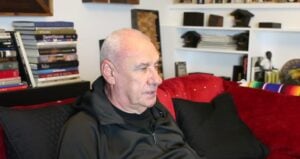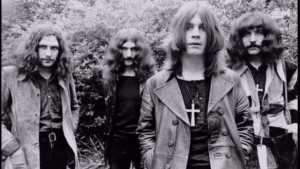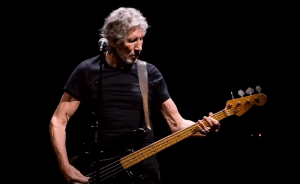Kenney Jones Opens Up Being Labeled As The “Wrong Drummer” For The Who

via Send Hill Studios / Youtube
Filling the shoes of a legend is no easy feat, especially when those shoes belonged to Keith Moon, the hurricane behind The Who’s sonic storm. Kenney Jones, however, didn’t shrink from the challenge.
Jones brought his own brand of groove and precision to the band, steering them through a new era of rock. But now, years later, a shadow has been cast on his contributions.
Roger Daltrey’s pronouncement of Jones being the “wrong drummer” ripped open old wounds and sparked fresh flames of debate. The former frontman even called Kenney’s drumming “simplistic and stifling” in a 1989 issue of Musician magazine.
Undeterred, Jones sits down with Classic Album Review, not to engage in a bitter war of words, but to shed light on his journey with The Who, confront misconceptions, and perhaps even bridge the gap between past and present.
https://twitter.com/BeaconPurple/status/1702964361206042857
“No problem me. Whatsoever.”
The cozy conversation with Classic Album Review took a sharp turn when the interviewer lobbed a quote from Roger Daltrey’s autobiography: “Kenny Jones is a great drummer, but he was completely the wrong drummer for The Who.”
Jones, ever the stoic beatkeeper, furrowed his brow. “I have no idea,” he replied. “John [Entwistle] and I and Pete [Townshend] got along great. No problem. No problem me. Whatsoever.”
Daltrey’s words, like a stray drumbeat, challenged Jones’s very identity within the legendary band. Yet, amidst the confusion, the drummer’s insistence on the camaraderie within the band served as a shield against the barbs of criticism.
He may not understand Daltrey’s perspective, but he wouldn’t let it rewrite his own history. Was it a mere clash of artistic visions, a lingering shadow of Keith Moon’s legacy, or something deeper?
The ghost of Keith Moon
Jones, still grappling with Daltrey’s criticism, ventured his own theory. “I think I know why,” he mused. “It’s been on my mind. I analyzed this a few times because, basically, [Keith] Moon had only been dead about three months before I joined the band.”
The drummer went on, “So when we started to do gigs, every time we looked around, he could see me instead of Moon, you know? I mean, that got to with it.” His words hung heavy, tinged with empathy for Daltrey’s struggle with the void left by their fallen brother.
The ghost of Keith Moon hovered over the interview, casting a long shadow on Jones’s legacy. He spoke with a quiet respect for his predecessor, acknowledging the pain of transition.
Jones’s theory painted a poignant picture of Daltrey’s struggle with loss. The raw wound of Moon’s absence, etched by every beat of the drum, seemed to color his perception of the new drummer.
https://twitter.com/BoredWeb3/status/1437551665863815172
The friction during the creation of Face Dances
The recording of Face Dances in 1981, Kenney’s debut with The Who, wasn’t just about laying down tracks. Producer Bill Szymczyk, speaking to Rock History Music in August 2023, recalled a turbulent atmosphere fueled by friction.
“Roger had a fairly big beef with Kenney,” Szymczyk revealed, “just because he wasn’t Keith Moon. Entwistle had a fairly big beef with me because I didn’t like the way he sounded half the time… So it was a tough time.”
The friction described by Szymczyk, though undoubtedly present, shouldn’t overshadow the camaraderie that also existed within The Who. Jones’s arrival, while initially unsettling the established dynamics, also brought in fresh energy and a different perspective.
Face Dances remains a testament to the band’s resilience and adaptability. Despite the internal struggles, they managed to channel their collective talent into an album that captured both the raw emotions of loss and the determination to move forward.
Her granddad is none other than Elvis
In the wake of Keith’s tragic passing in 1978, The Who faced the daunting task of filling his iconic drum stool. Kenney Jones was a close friend of Moon and a veteran drummer from Small Faces.
His connection to the band, established through friendships and collaborations like the “Tommy” soundtrack, made him a natural contender. In November of that same year, he officially became The Who’s new drummer.
Jones’s tenure spanned four years of studio albums, film soundtracks, and extensive touring, culminating in an electrifying performance at Live Aid. While his precise and groove-oriented style differed from Moon’s explosive theatricality, he brought his own brand of dynamism to the band.
Despite this, an undercurrent of tension existed between Jones and frontman Roger Daltrey. Daltrey’s preference for Moon’s wilder approach sometimes clashed with Jones’s grounded style, though he always maintained personal respect for Jones’s drumming.
Ultimately, Jones’s time with The Who ended in 1988, after receiving a lifetime achievement award together. He moved on to pursue other musical ventures, while The Who embarked on reunion tours with different drummers. And in a testament to the lasting bond, Pete Townshend later affirmed that Jones was “a good choice” for the band, acknowledging his significant contribution to their post-Moon era.












